Inside the clinic that treats Germantown’s ‘working poor’
Vonda Heard sat patiently in the waiting room at St. Catherine Laboure Medical Clinic on Germantown Avenue near Rittenhouse St. one recent day.
She stared at the white walls with pamphlets of literature in bins just below her feet. Below her thick-rimmed glasses, a slight smile crossed her face.
Soon, she would get the care she needed for her chronic asthma.
“It’s not that I was looking for free health care,” the 47-year-old Germantown native said. “I was looking for affordable health care.”
The clinic’s history, mission
Heard is among many people in Germantown who get their medical care for no cost at the private, non-profit clinic that provides comprehensive medical care to the “working poor” who don’t have employer-provided health insurance and are neither poor enough to receive government-sponsored Medicaid nor old enough for Medicare.
The clinic, which started in Saint Vincent de Paul Roman Catholic Church’s parish hall, is named after a 19th century French nurse and member of the Daughters of Charity of Saint Vincent de Paul.
One patient’s story
Heard’s story is not unlike those of other patients who get their medical care at the clinic.
After her time as a doctor’s administrative assistant, she left to work as a missionary in the Dominican Republic. When she returned, she had no medical insurance.
Unable to keep up with the $65 dollar co-pay or lab-work expenses at her previous doctor, Heard went without a medical visit for almost four years. Her sister eventually referred her to St. Catherine Laboure where she has received proper care since last November.
“As I was getting older, I was taking my rescue inhaler a lot, actually every day whenever I needed it,” said Heard. “They told me, ‘No don’t do that. Only take a puff of the Advair once in the morning and once in the evening and you should be fine all day’ and she was right,” said Heard.
Now, she visits every three to four weeks to get her high blood pressure checked. She also uses the clinic’s private pharmacy.
“Everyone wants to feel like they’re paying they’re own. They want to have self-respect, so this place allows you your dignity and it gives you that respect because you’re able to afford it,” said Heard.
“They’re also very helpful,” she continued. “If you need something or a prescription, they’ll give you paperwork or do research to help you find some services that you can afford, so that’s what I truly appreciate.”
Filling health-care gaps
Physician Sheila Davis and physician assistant Michele Palos-Samsi are the clinic’s executive directors.
The pair, hailing from Delaware County and Bethlehem respectively, started it at St. Vincent’s in 1999.
They said they felt it was their calling to respond to the need for health care, particularly for the uninsured who lived in the neighborhood.
Using their stethoscopes and medical experience, they decided to take action and eventually move to their own location on Germantown Avenue.
“Our vision was to fill the gap in health care that we saw the uninsured didn’t have,” said Davis, a graduate of St. Joseph’s University and Philadelphia College of Osteopathic Medicine.
“There are the over-crowded health centers where most people feel like they don’t get treated with dignity. Then, there’s the emergency room,” she continued. “We felt like those people deserved the same access to basic health care. It doesn’t matter that they have a lower income.”
What they see
The clinic provides patients with one-on-one attention from physicians. The most common conditions they treat are high blood pressure, depression, anxiety, diabetes, thyroid and cardiovascular diseases.
With about 4,000 visits a year, they can track patients’ medicine habits, become closely involved in the psychological aspects of their lives and provide the right care because of the small practice.
“It’s like a family,” said Palos-Samsi, who graduated from West Chester University with a degree in psychology. “We want to find out what’s going on personally so we know how to treat them.”
He slipped through the cracks
One patient the two women remember more than others was a 50-year-old man who suffered from alcoholism, high blood pressure and depression.
“I’ll never forget the one day he walked a mile from his home to come see us,” said Palos-Samsi. “He was all dirty, and hunched over with a very grey-colored skin. I knew he was having a heart attack, but when the medics came, they ended up never treating him. He was known as the drunk they always saw.”
After finding him unconscious in a local hospital’s waiting room, Palos-Samsi and Davis knew they had to improve their form of health care.
Before the man died from liver failure, he often worried that St. Catherine’s would send him on his way once he eventually received health insurance.
“Our policies are so different now,” said Palos-Samsi. “If someone gets insurance, we make a transition appointment for him or her to report back to us after they’ve seen their new doctor. We don’t just assume they’re going to be OK because that was the mistake we made before.”
Carrie Hodousek is a La Salle University students who writes for GermantownBeat, a local student-produced news site. NewsWorks features articles from GermantownBeat on its Northwest Philadelphia community sites and contributes multimedia journalism training to the program.
WHYY is your source for fact-based, in-depth journalism and information. As a nonprofit organization, we rely on financial support from readers like you. Please give today.




